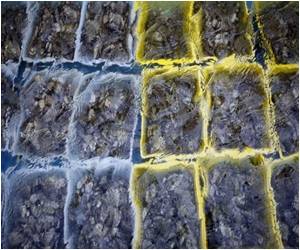Forty-year-old Mohammed Iqbal sifts through sludge in the back alleys of Kolkata's jewellery market for gold dust, his weathered face brightens slightly at the recent uptick in work.

Iqbal estimates he normally earns just 150 to 200 rupees ($2.40 to $3.20) a day from selling flecks of the precious metal that he painstakingly finds on the ground and in the drains of the grimy alleys.
But the onset of India's raucous festival season, especially the biggest Hindu celebration of Diwali on Thursday, brings a relative bonanza for Iqbal, with his income more than doubling.
"There is a lot of work during Durga Puja and Diwali. We make more money then," Iqbal told AFP as he hunched over his pans filled with thick, black muck early one morning.
"We never got an education. This is the work that my grandfather and my father did and this is what I do now. My two sons do this too. We have no other work," he said of his boys aged 18 and 16.
Over the several days of Diwali, known as the festival of lights, middle-class families throng Kolkata's Bowbazar and other markets throughout the country to buy gold jewellery.
Advertisement
The festival coincides with India's wedding season, which runs from October to February, with gold a crucial part of a bride's dowry.
Yellow particles are swept outside, while some are washed into drains, surfacing in the alleys where the newaras sift through the sludge to find them.
- Prayers and gold -
Jewellery traders predict a prosperous Diwali this year, with world and local gold prices lower, making resulting ornaments more affordable.
"We are expecting a very good Diwali compared to previous years," All India Gems and Jewellery Trade Federation director Bachhraj Bamalwa told AFP.
"The mood is upbeat and there have been incremental increases in sales of gold jewellery," he said this week.
India is the world's biggest buyer of gold alongside China, and imports normally jump during the festival season, further widening the trade deficit.
Gold traders and importers had been hoping that Prime Minister Narendra Modi's government would lift stiff 10 percent import duties slapped on the metal last year by the previous administration to rein in imports.
Although the duties have remained, India's central bank has lifted restrictions on importing gold, allowing more private agencies to bring in shipments.
Bamalwa said that has pushed down the local price of the commodity this year, lifting consumer spirits. In New Delhi, shoppers crowded the capital's old quarter searching for gold and other bargains for Diwali.
"It doesn't really matter that the price keeps going up and down. Buying gold is a tradition, it's a custom ... you cannot offer prayers without also offering some gold," housewife Aswani Puja said.
- Newaras play key role -
Some jewellery manufacturers in Kolkata are grateful for the newaras, who help keep production costs down for the industry, which was formed in the 1800s and employs some 20,000 people.
"If they are not doing this then we have to buy gold and the only gold source is Western countries," said Nabin Kumar Chanbar in his shop which opened in 1883.
"They are very ... helpful for us because ...the wastage of gold is converted to the industry," Chanbar said, rows of jewellery glittering behind him.
On the main street of Bowbazar shortly after dawn, Mohammed Ashu, 25, and his two younger brothers are pouring over some soft polystyrene packaging found dumped outside a workshop.
The youngest, teenager Mohammed Amir, who is unsure of his exact age and has never been to school, is convinced the packaging contains flecks of silver.
The brothers consider the find a stroke of luck, and good timing for Ashu, whose wife had a baby 10 days ago and struggles to put enough food on the table.
"This is very good but we will have to share," Ashu said with a smile, pointing to his brothers.
Source-AFP










